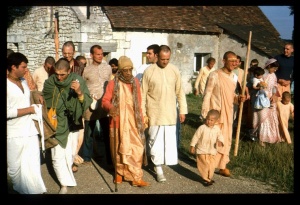CC Adi 5.225: Difference between revisions
No edit summary |
(Vanibot #0054 edit - transform synonyms into clickable links, which search similar occurrences) |
||
| Line 17: | Line 17: | ||
<div class="synonyms"> | <div class="synonyms"> | ||
''sākṣāt'' | ''[//vanipedia.org/wiki/Special:VaniSearch?s=sākṣāt&tab=syno_o&ds=1 sākṣāt]'' — directly; ''[//vanipedia.org/wiki/Special:VaniSearch?s=vrajendra&tab=syno_o&ds=1 vrajendra]-[//vanipedia.org/wiki/Special:VaniSearch?s=suta&tab=syno_o&ds=1 suta]'' — the son of Nanda Mahārāja; ''[//vanipedia.org/wiki/Special:VaniSearch?s=ithe&tab=syno_o&ds=1 ithe]'' — in this matter; ''[//vanipedia.org/wiki/Special:VaniSearch?s=nāhi&tab=syno_o&ds=1 nāhi]'' — there is not; ''[//vanipedia.org/wiki/Special:VaniSearch?s=āna&tab=syno_o&ds=1 āna]'' — any exception; ''[//vanipedia.org/wiki/Special:VaniSearch?s=yebā&tab=syno_o&ds=1 yebā]'' — whatever; ''[//vanipedia.org/wiki/Special:VaniSearch?s=ajñe&tab=syno_o&ds=1 ajñe]'' — a foolish person; ''[//vanipedia.org/wiki/Special:VaniSearch?s=kare&tab=syno_o&ds=1 kare]'' — does; ''[//vanipedia.org/wiki/Special:VaniSearch?s=tāṅre&tab=syno_o&ds=1 tāṅre]'' — unto Him; ''[//vanipedia.org/wiki/Special:VaniSearch?s=pratimā&tab=syno_o&ds=1 pratimā]'' — hena''—as a statue; ''[//vanipedia.org/wiki/Special:VaniSearch?s=jñāna&tab=syno_o&ds=1 jñāna]'' — such a consideration. | ||
</div> | </div> | ||
Latest revision as of 19:06, 19 February 2024

His Divine Grace
A.C. Bhaktivedanta Swami Prabhupada
A.C. Bhaktivedanta Swami Prabhupada
TEXT 225
- sākṣāt vrajendra-suta ithe nāhi āna
- yebā ajñe kare tāṅre pratimā-hena jñāna
SYNONYMS
sākṣāt — directly; vrajendra-suta — the son of Nanda Mahārāja; ithe — in this matter; nāhi — there is not; āna — any exception; yebā — whatever; ajñe — a foolish person; kare — does; tāṅre — unto Him; pratimā — hena—as a statue; jñāna — such a consideration.
TRANSLATION
Without a doubt He is directly the son of the King of Vraja. Only a fool considers Him a statue.